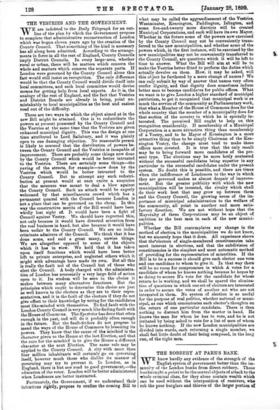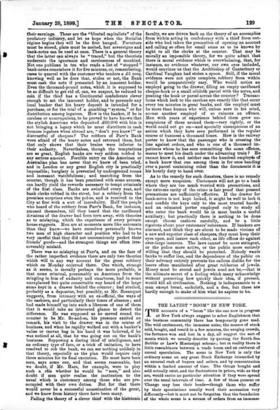THE ROBBERY AT PARR'S BANK.
WE know hardly any evidence of the strength of the English system of government better than the im- munity of the London banks from direct robbery. Those banks ought a priori to be the central objects of attack to the whole criminal class, for they alone contain wealth which can be used without the interposition of receivers, who rob the poor burglars and thieves of the larger portion of their earnings. These are the "bloated capitalists" of the predatory industry, and let us hope when the Socialist regime begins they will be the first hanged. Furniture must be stored, plate must be melted, but sovereigns and bank-notes can be used at once. There is a general theory that the latter can always be "traced," but the theorists underrate the ignorance and carelessness of mankind. Not one publican in ten who reads a list of " stopped " bank-notes remembers it for five minutes, or, remembering, cares to quarrel with the customer who tenders a £5 note, knowing well as he does that, stolen or not, the Bank must cash the note if presented by an innocent holder. Even the thousand-pound notes, which . it is supposed to be so difficult to get rid of, can, we suspect, be reduced to coin if the thief has a Continental confederate clever enough to act the innocent holder, and to persuade any local banker that his heavy deposit is intended for a purchase, or for the trial of a gambling "system," or for distribution among legatees. How is the banker, if he is careless or unscrupulous, to be proved to have known that the stylish American who deposited xeo,ono with him is not bringing a legacy which he must distribute in cash because legatees when abroad are, "don't you know !" so distrustful of cheques ? The robbers of Parr's Bank were afraid of the heavy notes and returned them, but that only shows that their brains were inferior to their audacity. Nevertheless, though the temptations are so great, English banks are very seldom robbed to any serious amount. Forcible entry on the American or Australian plan has never that we know of been tried, and in London or any great English city is practically impossible; burglary is prevented by underground rooms and incessant watchfulness ; and snatching from the counter, though it has been practised with some success, can hardly yield the rewards necessary to tempt criminals of the first class. Banks are swindled every year, and bank clerks robbed in the street, but a robbery from the premises surprises even the police, and is received in the City at first with a sort of incredulity. Half the people who heard of the robbery from Parr's Bank, for instance, amused themselves, till they heard that the cardboard divisions of the drawer had been torn away, with theories as to mislaying, which the experience of every private house suggests. Men are at moments more like automata than they know—we have ourselves personally known two men of high character and position who had to be very careful that they did not unconsciously pocket their friends' goods—and the strangest things are often irre- coverably mislaid.
There was no mislaying at Parr's, and on the face of the rather imperfect evidence there are only two theories which will in any way account for the great robbery which on Monday occurred there. One which, strange as it seems, is morally perhaps the more probable, is that some criminal, presumably an American from the mingling in him of audacity and smartness, had in some unexplained but quite conceivable way heard of the large sums kept in a drawer behind the counter • had studied, probably as a depositor, but possibly, as Mr. Bosanquet suggests, from intimacy with an ex-official, the ways of the cashiers, and particularly their times of absence ; and had made himself up into such a likeness of one of them that it would take an interested glance to detect the difference. He was supposed as he moved round the counter to be Mr. So-and-so, his presence excited no remark, his visit to the drawer was in the course of business, and when he rapidly walked out with, a banker's valise or canvas bag in his hand it was believed, if he was noticed at all, that he was going out on the bank's business. Supposing a daring thief of intelligence, and an ordinary type of face, or a trick of imitation, to have resolved to rob the bank, we can see nothing unlikely in that theory, especially as the plan would require only three minutes for its final execution. He must have been seen, says some one, and that seems reasonable, but we doubt, if Mr. Hare, for example, were to play such a role whether he would be "seen," and also doubt if men quite realise the inattention to the usual which is customary among those who are pre- occupied with their own duties. But for that there would never be a successful assassination of the great, and we know from history there have been many.
Failing the theory of a clever thief with the histrionic faculty, we are driven back on the theory of an accomplice from within acting in confederacy with a thief from out- side who had taken the precaution of opening an account and calling so often for small sums as to be known by sight to all the clerks at the counter. That may be morally an impossible theory, for we quite admit that there is moral evidence which is overwhelming, that, for instance, no evidence whatever, our own eyes included, would convince us that the Archbishop of Canterbury or Cardinal Vaughan had stolen a spoon. Still, if the moral evidence were not quite complete, robbery from within would be comparatively easy. Who would notice an employe going to the drawer, filling an empty cardboard cheque-book or a small oilcloth parcel with the notes, and pushing the book or parcel across the counter? Transac- tions which look to the careless eye exactly like that occur every ten minutes in great banks, and the employe must be more than human who will, unless sure in his mind, accuse another employe of so ruinous an offence. Men with years of experience behind them grow un- suspicious of those around them—very rightly, or the world could not go on—and specially unsuspicious of an action which they have seen performed in the regular course of business a thousand times. How is the railway porter to know that the passenger who is crossing the line against orders, and who is one of a thousand im- patients whom he has seen committing the same offence, means to meet his death under the advancing train ? He cannot know it, and neither can the hundred employs of a bank know that one among them is for once handing over a parcel containing other than the documents it is his hourly duty to hand over.
As to the remedy for such disasters, there is no remedy except more suspicion. Customers will not go to a bank where they are too much worried with precautions, and. the extreme rarity of the crime is fair proof that present precautions are sufficiently effective. If the drawer for bank-notes is not kept locked, it might be well to lock it and confide the keys only to the most trusted hands ; and an educated porter employed only to study all who enter the bank would be in most banks a useful auxiliary; but practically there is nothing to be done except choose cashiers carefully, and be a little rigorous about poor customers' references. If bankers are alarmed, and think they are about to be made victims of a new and superior class of sharpers, they must keep their eyes open, and insure each other, as life offices do against over-large insurers. The laws cannot be more stringent, or the police more active, or the public more entirely willing that they should be protected. Nobody wants banks to suffer loss, and the dependence of the public on their solvency entirely prevents the callous dislike for the losers often manifested after great robberies of jewels. Money must be stored and jewels need not be,—that is the ultimate secret of a feeling which many acknowledge without perceiving how quickly their idea, if pressed, would kill all civilisation. Nothing is indispensable to a man except bread, sackcloth, and a den, but these are hardly enough to make of him what he aspires to be.



















































 Previous page
Previous page